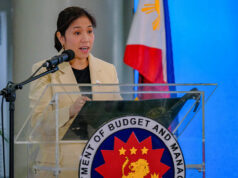Economic managers say rising revenues to help keep budget gap manageable
THE DEVELOPMENT Budget Coordination Committee (DBCC) said on Tuesday that government revenues are “strong” enough to help finance a bigger deficit next year, supported by bigger collections as a result of ongoing tax reform.
The DBCC presented at a hearing of the House of Representatives Committee on Appropriations the economic assumptions of the P3.757-trillion proposed national budget for 2019 that is slightly less than the P3.767-trillion spending plan for this year.
In 2019, the government has programmed a bigger deficit equivalent to 3.2% of gross domestic product (GDP) from three percent of GDP this year in a bid to accelerate infrastructure and social spending, but will revert to three percent from 2020 to 2022.
REMAINING TAX REFORMS SUBMITTED
Finance Secretary Carlos G. Dominguez III told reporters after the hearing that his department has submitted to Congress the remaining planned tax reform packages.
The first package — Republic Act No. 10963 or the Tax Reform for Acceleration and Inclusion (TRAIN) — slashed personal income tax rates but increased or added taxes on several items when the law took effect on Jan. 1, while the second package now being discussed in the House seeks to slash corporate income tax rates gradually to as low as 20% from 30% currently while removing redundant fiscal incentives.
Mr. Dominguez said the other packages submitted this month to Congress provide further increases in excise tax rates for tobacco and alcohol products, a bigger government share in mining earnings, a simplified, uniform property valuation scheme and rationalized capital income taxation.
“The key to fiscal stability is revenue generation,” Mr. Dominguez said during the hearing.
He noted that the revenues reached P1.41 trillion last semester, 20% more than last year and eight percent higher than target, adding that collections under Republic Act No. 10963 — or the Tax Reform for Acceleration and Inclusion (TRAIN) law that took effect on Jan. 1 — accounted for P33.7 billion of that amount.
“These are truly promising growth figures. Rest assured that our main revenue agencies are committed to maintain the momentum,” he said.
“The remaining four packages will generate additional revenue streams which will be used to invest more in our massive infrastructure build-up and human capital through expanded social amelioration programs,” said Mr. Dominguez.
He said that revenues are projected to reach P3.2 trillion in 2019, 16.2% more than the revenue target for this year and equivalent to 16.5% of GDP.
Mr. Dominguez said that the TRAIN — the first of up to five tax reform packages that slashed personal income tax rates but increased or added taxes on several items — as well as Package 1B providing for general and estate tax amnesty as well as an increase in motor vehicle users charge that is still in Congress are estimated to generate a total of P181.4 billion next year.
“Between now and 2022, with tax reforms and continuing improvement in tax administration, we are looking to improving the ratio of revenues to GDP (gross domestic product) from 15.6% in 2017 to 17.6% by 2022.”
He added that tax-to-GDP ratio is programmed to increase from 14.2% last year to 16.9% by 2022. “This will bring our tax effort to about the regional average,” said Mr. Dominguez.
“This administration is committed to long-term fiscal sustainability. Be assured we will continue to exercise fiscal responsibility and maintain sound fiscal policies to support higher and more inclusive growth. Fiscal strategy remains to be prudent, sustainable, and supportive of the government’s development objectives,” Mr. Dominguez said.
ERADICATE UNDERSPENDING
Budget Secretary Benjamin E. Diokno said that the 2019 cash-based budget — which allocates only those funds that can be used within 2019 — would “virtually eradicate underspending,” as projects intended to be implemented in the fiscal year should be paid and delivered in the same year, as opposed to the current obligation-based budget that allows agencies to enter into contracts even if implementation will actually start in succeeding years. “Past years it was slow and inefficient. In 2014 and 2015, forgone projects due to underspending amounted to P630 billion.”
Socioeconomic Planning Secretary Ernesto M. Pernia meanwhile said that the economic outlook was “upbeat” with GDP growth targeted at 7-8% annually until 2022, when President Rodrigo R. Duterte ends his six-year term, from 6.3% in 2010-2016.
Risks to this outlook include rising inflation and delays in infrastructure projects due to bottlenecks, as well as tightening in global financial markets and an escalation in trade tensions between the United States and China, among others.
Lawmakers at the hearing questioned the proposed reduction in the national budget, fearing this would mean an interruption of development projects.
“We passed the TRAIN law. Now they come us, asking why hold muna tayo sa buildings, barangay health centers. Nasaan ang (Where are the) 2019 projects?,” said House Appropriations committee chairman Rep. Karlo Alexei B. Nograles (Davao City 1st district).
“All of these could have been addressed if DBCC gave us a bigger budget.”
Mr. Diokno explained that, under the new cash-based system, the Budget department allocated funds based on agencies’ absorptive capacity. — Elijah Joseph C. Tubayan



